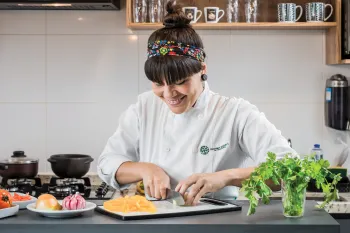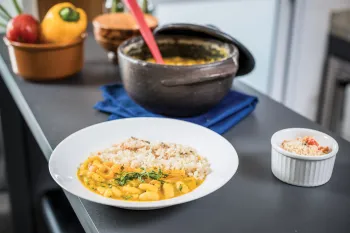I’ve often dreamt of taking plant-based food to the land of my ancestors here in Brazil. As a chef with Humane Society International, I create plant-based recipes based on ingredients available in schools and have trained hundreds of chefs in how to make them. This year we partnered with the municipality of Salvador—one of Brazil’s largest cities in terms of population—to incorporate meatless meals one day a week in all 444 municipal schools.
Through our partnership, 170,000 students will improve their diet with delicious plant-based recipes, and more than 10 million meals will become animal-free each year. It’s especially exciting to create recipes for schoolchildren, who are always so interested and engaged with the well-being of the planet and animals. It is also exciting to help a new generation recognize and be more than satisfied with meals that are not focused around animal products.
In choosing the recipes to share with the team in Salvador, I sought to maintain the essence and richness of the area’s regional traditions. Salvador is one of the cities that most keeps the heritage of Black and Indigenous peoples alive, especially through its cuisine.
One recipe I created for the school menu was moqueca, a well-known dish traditionally made with fish. The name comes from pokeka, a term used by Indigenous peoples for fish they used to bake wrapped in leaves. Thanks to the cultural exchange between African and Indigenous peoples, over time the recipe gained ingredients such as palm oil and cilantro and became what it is today.
My version includes white beans as a base, because they have a very soft texture and a light flavor that can easily absorb the other seasonings. Their appearance is also reminiscent of the fish-based moqueca.
I shared the recipe with the municipality’s chefs during a training workshop, which included a satisfaction survey at the end. By including the familiar flavors of palm oil and cilantro, the moqueca inspired what we call acolhimento—the feeling of getting a warm hug, as if food is embracing our souls. The chefs were also impressed with the “taste of the sea” that we managed to keep, even without using any animal products: just simple and affordable ingredients that they already have available for school lunches.
This year marks 14 years of plant-based cooking for me. When I started, my intention was to put all my love into the pans and to help people learn how simple, pleasurable and tasty eating compassionately can be. I love the infinite possibilities of creation and combinations that nature provides, and as an HSI chef, I feel fulfilled by teaching so many people how to make affordable, sustainable food that does not harm animals.
—Adriele Carvalho is a chef with Humane Society International in Brazil
demaerre/iStock.com
Try meat-free meals
One day a week can make a world of difference for your health, animals and the environment! Start by trying a new vegetable-packed dish or swap your usual entrée with a plant-based meat alternative.


